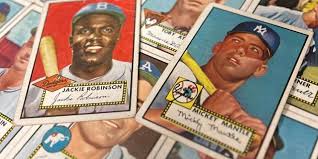Chaplain’s Corner: CXLVIII
“Simple Joys”
Growing up in the 1950’s my brother Mike and I did what we assumed every other American boy was doing. We collected baseball cards. At the local family store you could get five cards and one thin slab of gum for five cents. The gum, which tasted good for about five minutes, was the invention of a 23-year old accountant named Walter Deimer, who in 1928 worked for Frank H. Fleer Company. Deimer was committed to creating something that would allow kids to blow awesome bubbles. Deimer named his invention Double Bubble. It would ultimately bring untold joy to both children and dentists.
Mike and I were Cub fans and we hated the New York Yankees who were seemingly perennial World Series champions. For us, they were the Evil Empire. Therefore we took revenge on the Yankees in the only way we knew by abusing the cards that depicted their best players. Mickey Mantle, Yogi Berra and Roger Maris were their best players and we put their cards in the spokes of our bikes. The result was an awesome sound when we rode down the street and serious wear and tear on the cards. Take that, Yankee sluggers!
The joke of course was on us. Years later Mickey Mantle’s 1952 rookie card known as Topps 311 is widely considered the most popular baseball card of all time selling in 2018 in flawless condition in an auction for $2.88 million. Apparently, the original owner of that card had a good sense not to punish Mickey with his bike.
What’s going on here? How can a cheap piece of cardboard ascend to such heights of value? Mike Burkes, co-founder of the National Sports Collectors Convention thinks he knows the answer: “To get the card back was to get childhood back.”
Where in the Bible do we find such a vision for reclaiming our innocence? Incredibly, the answer is the book of Ecclesiastes. The same book that compels us to stare into the abyss of meaninglessness urges us to take joy in life’s simple pleasures. The author writes in 2:24-25, “A person can do nothing better than to eat and drink and find their satisfaction in their own toil. This too, I see, is from the hand of God, for without him, who can eat and find enjoyment.” And in verse 3:12 we read, “I know there is nothing better for people than to be happy and do good while they live.” Don’t Worry be Happy.
This feels light years away from wrestling with the heavy philosophical issue of why we are here in the first place. It’s a preview of the “healthy hedonism” that pervades the rest of the book-the assurance that people who receive the love and grace of God can actually become reacquainted with the sense of wonder they used to have when they were young.
We cannot start life over again, of course.
But Jesus puts another option on the table. We can become reborn. Spiritual rebirth doesn’t change our DNA, erase our worst memories of high school or undo decisions that keep us awake at night. But rebirth nonetheless brings wonderful gifts: new understanding, new power, and a new hope. Being reborn is like operating the old hardware of our lives with new software.
Jesus was entirely serious when he said that unless we become like little children, we can’t really grasp what God is up to in the world.
By God’s grace we can gradually reclaim the trust we once knew as kids. Even if we can’t undo life altering childhood decisions such as, “I think I’ll be a Cub fan.”
Faithfully,
Ron Naylor, Chaplain




